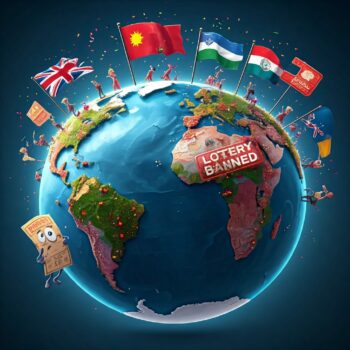If you thought all countries loved lotteries as much as they love bad reality TV, think again. While most nations are happily rolling out scratchcards and giant novelty cheques, some countries decided, “Nah, let’s ban the one thing that gives people hope between 9 to 5 shifts and soggy sandwiches for lunch.” Yes, that’s right—some countries have banned lotteries altogether. Why, you ask? Let’s dive into the madness with a side of sarcasm, shall we?

The Countries That Said ‘No’ to Fun
First up, we have North Korea—obviously. If there’s anything North Korea is famous for, it’s not being a party destination. So, it should come as no surprise that lotteries are a no-go there. Kim Jong-un prefers to keep all the excitement of life to himself, leaving the masses to enjoy state-approved entertainment, like watching paint dry or, you know, not winning money.
Next, say hello to Saudi Arabia. Known for many things, but lottery games aren’t one of them. Gambling, in any form, is banned under Islamic law, so forget about buying a ticket to dream about your golden yacht. Instead, your best bet is praying for good fortune, because that’s about as close to gambling as you’re going to get.
Then there’s China, where gambling is outlawed except for a few state-run options, but lotteries have been known to face resistance. In the People’s Republic, the government likes to maintain control over… well, everything. If you want to risk your hard-earned cash, why not donate it to the state directly? It’s kind of the same thing, right?
India also has a love-hate relationship with lotteries. Some states are fine with people spending their rupees on the chance of winning millions, while others like Tamil Nadu decided, “Nope, we’re banning this outright.” Why? Because apparently, people are better off gambling their lives away on cricket matches (oh wait, that’s illegal too).
Let’s not forget the United Arab Emirates. Like its Saudi counterpart, the UAE doesn’t mess with gambling. But here’s a twist: there’s a loophole! You can “enter a raffle,” but let’s be real—raffles are just lotteries in disguise. It’s like saying you’re on a “detox” diet while chugging green juices full of sugar. Same thing, right?
Why Ban Lotteries?
The reasons these countries give for banning lotteries? Pure logic, of course! The official line often comes down to morality, religion, and economic reasons. The logic goes something like this:
- It’s immoral! How dare you dream of being a millionaire? Your soul should be fed by the noble pursuit of endless toil, not by imagining yourself on a beach somewhere with a drink in hand. Seriously though, many countries have religious and cultural values that see gambling (and lotteries by extension) as a corrupting influence. Because obviously, being financially ruined through daily life expenses is more virtuous.
- It leads to financial ruin! Politicians claim lotteries are a tax on the poor—because we all know it’s way better to keep the poor poor through other, more traditional means, like unfair wages and exorbitant taxes. But yes, banning lotteries is the solution to all financial inequities. Or so they say.
- It’s bad for society! Think about it: If people keep spending their money on lotteries, who’s going to buy overpriced movie tickets or useless gadgets on impulse? If you win big, you might stop being a contributing member of society, and we simply can’t have that, can we?
Is It a Good Thing?
Now, is banning lotteries a good idea? Well, let’s break it down.
On one hand, lotteries are often criticized for giving people false hope. After all, the odds of winning are something like one in several million. So, governments say, “Why let people throw their money away?” Instead, they can keep their money for more important things—like paying taxes, rent, and that fourth streaming service they probably don’t need.
On the other hand, have you seen the look on someone’s face when they win? That sheer joy (followed by mild heart failure) when their numbers come up? It’s a rare moment of ecstasy in this otherwise mundane world. Why take that away from people? And let’s not forget the whole “lottery funding education and social projects” thing. That’s important too.
Fun Fact: When Banning Backfires
Here’s a fun (and totally real) story: when Ireland banned lotteries in the 18th century, did people stop gambling? Of course not! They just kept doing it underground, which created an entire criminal industry. It’s like telling a kid they can’t have a cookie—now they’ll want 10. The Irish lottery ban eventually got lifted because, well, the government realized that if anyone was going to profit from gambling, it should be them!
The moral of the story? People love lotteries. Ban them all you want, but if history’s taught us anything, it’s that people will find a way to gamble. They always do.
Conclusion: The Ban Hammer—A Blessing or a Curse?
So, are lottery bans good? The answer depends on whether you’re the person setting the rules or the person hoping to win a six-figure jackpot. For governments, banning lotteries can look like a noble effort to protect their citizens from themselves. For everyone else, it’s just one more thing that makes life a little less exciting.
Is banning lotteries really the moral high ground, or just a way to remind people that fun, too, can be regulated? That’s up for debate. What isn’t up for debate is this: whether you live in a lottery-happy country or a fun-killing regime, the dream of instant millions isn’t going anywhere. Just like the human desire to rebel against the system.
References:
- “Countries Where Lotteries Are Banned” – World Lottery Report
- “The History of Lottery Bans: From Ireland to India” – Gambling Daily
- “The Impact of Lottery Bans on Society” – Economic Insights








